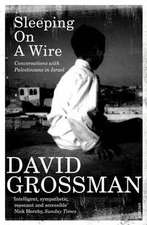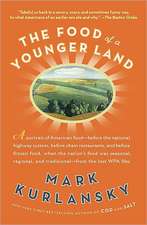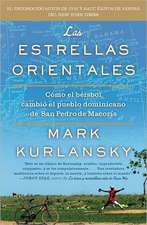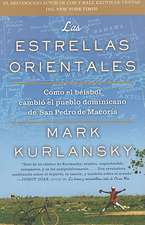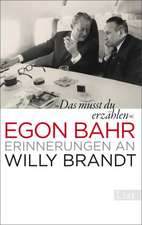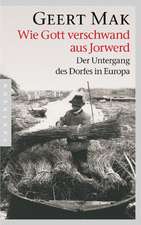1968
Autor Mark Kurlanskyen Limba Engleză Paperback – 2 feb 2005
| Toate formatele și edițiile | Preț | Express |
|---|---|---|
| Paperback (2) | 107.67 lei 3-5 săpt. | |
| Random House Trade – 31 dec 2004 | 107.67 lei 3-5 săpt. | |
| Vintage Publishing – 2 feb 2005 | 119.63 lei 6-8 săpt. |
Preț: 119.63 lei
Nou
Puncte Express: 179
Preț estimativ în valută:
22.89€ • 23.81$ • 18.90£
22.89€ • 23.81$ • 18.90£
Carte tipărită la comandă
Livrare economică 14-28 aprilie
Preluare comenzi: 021 569.72.76
Specificații
ISBN-13: 9780099429623
ISBN-10: 0099429624
Pagini: 464
Ilustrații: integ b&w images
Dimensiuni: 129 x 200 x 29 mm
Greutate: 0.32 kg
Editura: Vintage Publishing
Locul publicării:United Kingdom
ISBN-10: 0099429624
Pagini: 464
Ilustrații: integ b&w images
Dimensiuni: 129 x 200 x 29 mm
Greutate: 0.32 kg
Editura: Vintage Publishing
Locul publicării:United Kingdom
Notă biografică
Mark Kurlansky is the James A. Beard Award-winning author of the New York Times bestseller Cod: A Biography of the Fish That Changed the World; Salt: A World History; The Basque History of the World; A Chosen Few: The Resurrection of European Jewry; A Continent of Islands: Searching for the Caribbean Destiny; a collection of stories, The White Man in the Tree; and a children’s book, The Cod’s Tale; as well as the editor of Choice Cuts: A Savory Selection of Food Writing from Around the World and Throughout History. He lives in New York City.
From the Hardcover edition.
From the Hardcover edition.
Extras
THE WINTER OF OUR DISCONTENT
The things of the eye are done.
On the illuminated black dial,
green ciphers of a new moon-
One, two, three, four, five, six!
I breathe and cannot sleep.
Then morning comes,
saying, "This was night."
-Robert Lowell, "Myopia: a Night,"
from For the Union Dead, 1964
CHAPTER 1
THE WEEK IT BEGAN
The year 1968 began the way any well-ordered year should-on a Monday morning. It was a leap year. February would have an extra day. The headline on the front page of The New York Times read, world bids adieu to a violent year; city gets snowfall.
In Vietnam, 1968 had a quiet start. Pope Paul VI had declared January 1 a day of peace. For his day of peace, the pope had persuaded the South Vietnamese and their American allies to give a twelve-hour extension to their twenty-four-hour truce. The People's Liberation Armed Forces in South Vietnam, a pro-North Vietnamese guerrilla force in the South popularly known as the Viet Cong, announced a seventy-two-hour cease-fire. In Saigon, the South Vietnamese government had forced shop owners to display banners that predicted, "1968 Will See the Success of Allied Arms."
At the stroke of midnight in South Vietnam's Mekong Delta, the church bells in the town of Mytho rang in the new year. Ten minutes later, while the bells were still ringing, a unit of Viet Cong appeared on the edge of a rice paddy and caught the South Vietnamese 2nd Marine Battalion by surprise, killing nineteen South Vietnamese marines and wounding another seventeen.
A New York Times editorial said that although the resumption of fighting had shattered hopes for peace, another chance would come with a cease-fire in February for Tet, the Vietnamese New Year.
"L'année 1968, je la salue avec sérénité," pronounced Charles de Gaulle, the tall and regal seventy-eight-year-old president of France, on New Year's Eve. "I greet the year 1968 with serenity," he said from his ornate palace where he had been governing France since 1958. He had rewritten the constitution to make the president of France the most powerful head of state of any Western democracy. He was now three years into his second seven-year term and saw few problems on the horizon. From a gilded palace room, addressing French television-whose only two channels were entirely state controlled-he said that soon other nations would be turning to him and that he would be able to broker peace in not only Vietnam but also the Middle East. "All signs indicate, therefore, that we shall be in a position to contribute most effectively to international solutions." In recent years he had taken to referring to himself as "we."
As he gave his annual televised message to the French people, the man the French called the General or Le Grand Charles seemed "unusually mellow, almost avuncular," sparing harsh adjectives even for the United States, which of late he had been calling "odious." His tone contrasted with that of his 1967 New Year's message, when he had spoken of "the detestable unjust war" in Vietnam in which a "big nation" was destroying a small one. The French government had grown concerned at the level of animosity that France's allies had been directing at it.
France was enjoying a quiet and prosperous moment. After World War II, the Republic had fought its own Vietnam war, a fact that de Gaulle seemed to have forgotten. Ho Chi Minh, America's enemy, had been born under French colonial rule the same year as de Gaulle and had spent most of his life fighting the French. He had once lived in Paris under the pseudonym Nguyen O Phap, which means "Nguyen who hates the French." During World War II, Franklin Roosevelt had warned de Gaulle that after the war France should give Indochina its independence. But de Gaulle told Ho, even as he was enlisting his people in the fight against the Japanese, that after the war he intended to reestablish the French colony. Roosevelt argued, "The people of Indochina are entitled to something better than that." De Gaulle was determined that his Free French troops participate in any action in Indochina, saying, "French bloodshed on the soil of Indochina would constitute an impressive territorial claim."
After World War II, the French fought Ho for Vietnam and suffered bitter defeat. Then they fought and lost in Algeria. But since 1962 France had been at peace. The economy was growing, despite de Gaulle's notorious lack of interest in the fine points of economics. Between the end of the Algerian war and 1967, real wages in France rose 3.6 percent each year. There was a rapid increase in the acquisition of consumer goods-especially cars and televisions. And there was a dramatic increase in the number of young people attending universities.
De Gaulle's prime minister, Georges Pompidou, anticipated few problems for the year ahead. He predicted that the Left would be more successful in unifying than they would in actually taking power. "The opposition will harass the government this year," the prime minister announced, "but they will not succeed in provoking a crisis."
The popular weekly Paris Match placed Pompidou on a short list of politicians who would maneuver in 1968 to try to replace the General. Yet the editors predicted there would be more to watch abroad than in France. "The United States will unleash one of the fiercest electoral battles ever imagined," they announced. In addition to Vietnam, they saw the potential hot spots as a fight over gold and the dollar, growing freedom in the Soviet Union's Eastern satellite countries, and the launching of a Soviet space weapons system.
"It is impossible to see how France today could be paralyzed by crisis as she has been in the past," said de Gaulle in his New Year's message.
Paris had never looked brighter, thanks to Culture Minister André Malraux's building-cleaning campaign. The Madeleine, the Arc de Triomphe, the Pantheon, and other landmark buildings were no longer gray and charcoal but beige and buff, and this month cold-water sprays were going to remove seven hundred years of grime from Notre Dame Cathedral. It was one of the great controversies of the moment in the French capital. Would the water spray damage the building? Would it look oddly patchwork, revealing that not all the stones were originally of matching color?
De Gaulle, seated in his palace moments before midnight on the eve of 1968, was serene and optimistic. "In the midst of so many countries shaken by confusion," he promised, "ours will continue to give an example of order." France's "primordial aim" in the world is peace, the General said. "We have no enemies."
Perhaps this new Gaullian tone was influenced by dreams of a Nobel Peace Prize. Paris Match asked Pompidou if he agreed with some of the General's inner circle who had expressed outrage that de Gaulle had not already received the prize. But Pompidou answered, "Do you really think that the Nobel Prize could be meaningful to the General? The General is only concerned about history, and no jury can dictate the judgment of history."
Aside from de Gaulle, the American computer industry struck one of the new year's rare notes of optimism, predicting a record year for 1968. In the 1950s computer manufacturers had estimated that six computers could serve the needs of the entire United States. By January 1968 fifty thousand computers were operating in the country, of which fifteen thousand had been installed in the past year. The cigarette industry was also optimistic that its 2 percent growth in sales in 1967 would be repeated in 1968. The executive of one of the leading cigarette manufacturers boasted, "The more they attack us the higher our sales go."
But by most measurements, 1967 had not been a good year in the United States. A record number of violent, destructive riots had erupted in black inner cities across the country, including Boston, Kansas City, Newark, and Detroit.
1968 would be the year in which "Negroes" became "blacks." In 1965, Stokely Carmichael, an organizer for the remarkably energetic and creative civil rights group the Student Nonviolent Coordinating Committee, or SNCC, invented the name Black Panthers, soon followed by the phrase Black Power. At the time, black, in this sense, was a rarely used poetic turn of phrase. The word started out in 1968 as a term for black militants, and by the end of the year it became the preferred term for the people. Negro had become a pejorative applied to those who would not stand up for themselves.
On the second day of 1968, Robert Clark, a thirty-seven-year-old schoolteacher, took his seat in the Mississippi House of Representatives without a challenge, the first black to gain a seat in the Mississippi State Legislature since 1894.
But in the civil rights struggle, action was shifting from the soft-spoken rural South to the hard-edged urban North. Northern blacks were different from blacks in the South. While the mostly southern followers of Martin Luther King, Jr., studied Mohandas Gandhi and his nonviolent anti-British campaign, Stokely Carmichael, who had grown up in New York City, became interested in violent rebels such as the Mau Mau, who had risen up against the British in Kenya. Carmichael, a good-humored man with a biting wit and a sense of theater that he brought from his native Trinidad, had been for years regularly jailed, threatened, and abused in the South, as had all the SNCC workers. And during those years there were always moments when the concept of nonviolence was questioned. Carmichael began hurling back abuse verbally and sometimes physically, confronting segregationists who harassed him. The King people chanted, "Freedom now!" The Carmichael people chanted, "Black Power!" King tried to persuade Carmichael to use the slogan "Black Equality" rather than "Black Power," but Carmichael kept his slogan.
Increasing numbers of black leaders wanted to fight segregation with segregation, imposing a black-only social order that at least paid lip service to excluding even white reporters from press briefings. In 1966 Carmichael became head of SNCC, replacing John Lewis, a soft-spoken southerner who advocated nonviolence. Carmichael turned SNCC into an aggressive Black Power organization, and in so doing Black Power became a national movement. In May 1967 Hubert "Rap" Brown, who had not been a well-known figure in the civil rights movement, replaced Carmichael as the head of SNCC, which by now was nonviolent in name only. In that summer of bloody riots, Brown said at a press conference, "I say you better get a gun. Violence is necessary-it is as American as cherry pie."
King was losing control over a badly divided civil rights movement in which many believed nonviolence had outlived its usefulness. 1968 seemed certain to be the year of Black Power, and the police were readying themselves. By the beginning of 1968 most American cities were preparing for war-building up their arsenals, sending undercover agents into black neighborhoods like spies into enemy territory, recruiting citizenry as a standing reserve army. The city of Los Angeles, where thirty-four people had been killed in an August 1965 riot in the Watts section, was contemplating the purchase of bulletproof armored vehicles, each of which could be armed with a .30-caliber machine gun; a choice of smoke screen, tear gas, or fire-extinguishing launchers; and a siren so loud it was said to disable rioters. "When I look at this thing, I think, My God, I hope we'll never have to use it," said Los Angeles deputy chief Daryl Gates, "but then I realize how valuable it would have been in Watts, where we had nothing to protect us from sniper fire when we tried to rescue our wounded officers." Such talk had become good politics since California governor Pat Brown had been defeated the year before by Ronald Reagan, largely because of the Watts riots. The problem was that the vehicles cost $35,000 each. The Los Angeles Sheriff's Office had a more cost-effective idea-a surplus army M-8 armored car for only $2,500.
In Detroit, where forty-three people died in race riots in 1967, the police already had five armored vehicles but were stockpiling tear gas and gas masks and were requesting antisniper rifles, carbines, shotguns, and 150,000 rounds of ammunition. One Detroit suburb had purchased an army half-track-a quasi tank. The city of Chicago purchased helicopters for its police force and started training 11,500 policemen in using heavy weapons and crowd control techniques in preparation for the year 1968. From the outset of the year, the United States seemed to be run by fear.
On January 4, thirty-four-year-old playwright LeRoi Jones, an outspoken Black Power advocate, was sentenced to two and a half to three years in the New Jersey State Penitentiary and fined $1,000 for illegal possession of two revolvers during the Newark riots the previous summer. In explaining why he had imposed the maximum sentence, Essex County judge Leon W. Kapp said that he suspected Jones was "a participant in formulating a plot" to burn Newark on the night he was arrested. Decades later, known as Amiri Baraka, Jones became the poet laureate of New Jersey.
In Vietnam, the war U.S. officials were forever telling correspondents was about to end still seemed far from over.
When the French had left in 1954, Vietnam was divided into a North Vietnam ruled by Ho Chi Minh, who had largely controlled the region anyway, and a South Vietnam left in the hands of anti-communist factions. By 1961 the Northern communists had gained control of half the territory of South Vietnam through the Viet Cong, which met with little resistance from the Southern population. That year the North began sending troops of their regular army south along what became known as the Ho Chi Minh Trail to complete the takeover. The U.S. responded with increased involvement though it had always been involved-in 1954 the U.S. had been financing an estimated four-fifths of the cost of the French war effort. In 1964 with North Vietnam's position steadily strengthening, Johnson had used an alleged naval attack in the Gulf of Tonkin as the pretext for open warfare. From that point on, the Americans expanded their military presence each year.
In 1967, 9,353 Americans were killed in Vietnam, more than doubling the total number of Americans previously killed, which now stood at 15,997, with another 99,742 Americans wounded. Newspapers ran weekly hometown casualty reports. And the war was also taking a toll on the economy, at a cost of an estimated $2 billion to $3 billion a month. During the summer, President Johnson had asked for a large tax increase to stanch the growing debt. The Great Society, the massive social spending program that Johnson had begun as a memorial to his fallen predecessor, was dying from lack of funds. A book published at the beginning of 1968 called The Great Society Reader: The Failure of American Liberalism contended that the Great Society and liberalism itself were dying.
From the Hardcover edition.
The things of the eye are done.
On the illuminated black dial,
green ciphers of a new moon-
One, two, three, four, five, six!
I breathe and cannot sleep.
Then morning comes,
saying, "This was night."
-Robert Lowell, "Myopia: a Night,"
from For the Union Dead, 1964
CHAPTER 1
THE WEEK IT BEGAN
The year 1968 began the way any well-ordered year should-on a Monday morning. It was a leap year. February would have an extra day. The headline on the front page of The New York Times read, world bids adieu to a violent year; city gets snowfall.
In Vietnam, 1968 had a quiet start. Pope Paul VI had declared January 1 a day of peace. For his day of peace, the pope had persuaded the South Vietnamese and their American allies to give a twelve-hour extension to their twenty-four-hour truce. The People's Liberation Armed Forces in South Vietnam, a pro-North Vietnamese guerrilla force in the South popularly known as the Viet Cong, announced a seventy-two-hour cease-fire. In Saigon, the South Vietnamese government had forced shop owners to display banners that predicted, "1968 Will See the Success of Allied Arms."
At the stroke of midnight in South Vietnam's Mekong Delta, the church bells in the town of Mytho rang in the new year. Ten minutes later, while the bells were still ringing, a unit of Viet Cong appeared on the edge of a rice paddy and caught the South Vietnamese 2nd Marine Battalion by surprise, killing nineteen South Vietnamese marines and wounding another seventeen.
A New York Times editorial said that although the resumption of fighting had shattered hopes for peace, another chance would come with a cease-fire in February for Tet, the Vietnamese New Year.
"L'année 1968, je la salue avec sérénité," pronounced Charles de Gaulle, the tall and regal seventy-eight-year-old president of France, on New Year's Eve. "I greet the year 1968 with serenity," he said from his ornate palace where he had been governing France since 1958. He had rewritten the constitution to make the president of France the most powerful head of state of any Western democracy. He was now three years into his second seven-year term and saw few problems on the horizon. From a gilded palace room, addressing French television-whose only two channels were entirely state controlled-he said that soon other nations would be turning to him and that he would be able to broker peace in not only Vietnam but also the Middle East. "All signs indicate, therefore, that we shall be in a position to contribute most effectively to international solutions." In recent years he had taken to referring to himself as "we."
As he gave his annual televised message to the French people, the man the French called the General or Le Grand Charles seemed "unusually mellow, almost avuncular," sparing harsh adjectives even for the United States, which of late he had been calling "odious." His tone contrasted with that of his 1967 New Year's message, when he had spoken of "the detestable unjust war" in Vietnam in which a "big nation" was destroying a small one. The French government had grown concerned at the level of animosity that France's allies had been directing at it.
France was enjoying a quiet and prosperous moment. After World War II, the Republic had fought its own Vietnam war, a fact that de Gaulle seemed to have forgotten. Ho Chi Minh, America's enemy, had been born under French colonial rule the same year as de Gaulle and had spent most of his life fighting the French. He had once lived in Paris under the pseudonym Nguyen O Phap, which means "Nguyen who hates the French." During World War II, Franklin Roosevelt had warned de Gaulle that after the war France should give Indochina its independence. But de Gaulle told Ho, even as he was enlisting his people in the fight against the Japanese, that after the war he intended to reestablish the French colony. Roosevelt argued, "The people of Indochina are entitled to something better than that." De Gaulle was determined that his Free French troops participate in any action in Indochina, saying, "French bloodshed on the soil of Indochina would constitute an impressive territorial claim."
After World War II, the French fought Ho for Vietnam and suffered bitter defeat. Then they fought and lost in Algeria. But since 1962 France had been at peace. The economy was growing, despite de Gaulle's notorious lack of interest in the fine points of economics. Between the end of the Algerian war and 1967, real wages in France rose 3.6 percent each year. There was a rapid increase in the acquisition of consumer goods-especially cars and televisions. And there was a dramatic increase in the number of young people attending universities.
De Gaulle's prime minister, Georges Pompidou, anticipated few problems for the year ahead. He predicted that the Left would be more successful in unifying than they would in actually taking power. "The opposition will harass the government this year," the prime minister announced, "but they will not succeed in provoking a crisis."
The popular weekly Paris Match placed Pompidou on a short list of politicians who would maneuver in 1968 to try to replace the General. Yet the editors predicted there would be more to watch abroad than in France. "The United States will unleash one of the fiercest electoral battles ever imagined," they announced. In addition to Vietnam, they saw the potential hot spots as a fight over gold and the dollar, growing freedom in the Soviet Union's Eastern satellite countries, and the launching of a Soviet space weapons system.
"It is impossible to see how France today could be paralyzed by crisis as she has been in the past," said de Gaulle in his New Year's message.
Paris had never looked brighter, thanks to Culture Minister André Malraux's building-cleaning campaign. The Madeleine, the Arc de Triomphe, the Pantheon, and other landmark buildings were no longer gray and charcoal but beige and buff, and this month cold-water sprays were going to remove seven hundred years of grime from Notre Dame Cathedral. It was one of the great controversies of the moment in the French capital. Would the water spray damage the building? Would it look oddly patchwork, revealing that not all the stones were originally of matching color?
De Gaulle, seated in his palace moments before midnight on the eve of 1968, was serene and optimistic. "In the midst of so many countries shaken by confusion," he promised, "ours will continue to give an example of order." France's "primordial aim" in the world is peace, the General said. "We have no enemies."
Perhaps this new Gaullian tone was influenced by dreams of a Nobel Peace Prize. Paris Match asked Pompidou if he agreed with some of the General's inner circle who had expressed outrage that de Gaulle had not already received the prize. But Pompidou answered, "Do you really think that the Nobel Prize could be meaningful to the General? The General is only concerned about history, and no jury can dictate the judgment of history."
Aside from de Gaulle, the American computer industry struck one of the new year's rare notes of optimism, predicting a record year for 1968. In the 1950s computer manufacturers had estimated that six computers could serve the needs of the entire United States. By January 1968 fifty thousand computers were operating in the country, of which fifteen thousand had been installed in the past year. The cigarette industry was also optimistic that its 2 percent growth in sales in 1967 would be repeated in 1968. The executive of one of the leading cigarette manufacturers boasted, "The more they attack us the higher our sales go."
But by most measurements, 1967 had not been a good year in the United States. A record number of violent, destructive riots had erupted in black inner cities across the country, including Boston, Kansas City, Newark, and Detroit.
1968 would be the year in which "Negroes" became "blacks." In 1965, Stokely Carmichael, an organizer for the remarkably energetic and creative civil rights group the Student Nonviolent Coordinating Committee, or SNCC, invented the name Black Panthers, soon followed by the phrase Black Power. At the time, black, in this sense, was a rarely used poetic turn of phrase. The word started out in 1968 as a term for black militants, and by the end of the year it became the preferred term for the people. Negro had become a pejorative applied to those who would not stand up for themselves.
On the second day of 1968, Robert Clark, a thirty-seven-year-old schoolteacher, took his seat in the Mississippi House of Representatives without a challenge, the first black to gain a seat in the Mississippi State Legislature since 1894.
But in the civil rights struggle, action was shifting from the soft-spoken rural South to the hard-edged urban North. Northern blacks were different from blacks in the South. While the mostly southern followers of Martin Luther King, Jr., studied Mohandas Gandhi and his nonviolent anti-British campaign, Stokely Carmichael, who had grown up in New York City, became interested in violent rebels such as the Mau Mau, who had risen up against the British in Kenya. Carmichael, a good-humored man with a biting wit and a sense of theater that he brought from his native Trinidad, had been for years regularly jailed, threatened, and abused in the South, as had all the SNCC workers. And during those years there were always moments when the concept of nonviolence was questioned. Carmichael began hurling back abuse verbally and sometimes physically, confronting segregationists who harassed him. The King people chanted, "Freedom now!" The Carmichael people chanted, "Black Power!" King tried to persuade Carmichael to use the slogan "Black Equality" rather than "Black Power," but Carmichael kept his slogan.
Increasing numbers of black leaders wanted to fight segregation with segregation, imposing a black-only social order that at least paid lip service to excluding even white reporters from press briefings. In 1966 Carmichael became head of SNCC, replacing John Lewis, a soft-spoken southerner who advocated nonviolence. Carmichael turned SNCC into an aggressive Black Power organization, and in so doing Black Power became a national movement. In May 1967 Hubert "Rap" Brown, who had not been a well-known figure in the civil rights movement, replaced Carmichael as the head of SNCC, which by now was nonviolent in name only. In that summer of bloody riots, Brown said at a press conference, "I say you better get a gun. Violence is necessary-it is as American as cherry pie."
King was losing control over a badly divided civil rights movement in which many believed nonviolence had outlived its usefulness. 1968 seemed certain to be the year of Black Power, and the police were readying themselves. By the beginning of 1968 most American cities were preparing for war-building up their arsenals, sending undercover agents into black neighborhoods like spies into enemy territory, recruiting citizenry as a standing reserve army. The city of Los Angeles, where thirty-four people had been killed in an August 1965 riot in the Watts section, was contemplating the purchase of bulletproof armored vehicles, each of which could be armed with a .30-caliber machine gun; a choice of smoke screen, tear gas, or fire-extinguishing launchers; and a siren so loud it was said to disable rioters. "When I look at this thing, I think, My God, I hope we'll never have to use it," said Los Angeles deputy chief Daryl Gates, "but then I realize how valuable it would have been in Watts, where we had nothing to protect us from sniper fire when we tried to rescue our wounded officers." Such talk had become good politics since California governor Pat Brown had been defeated the year before by Ronald Reagan, largely because of the Watts riots. The problem was that the vehicles cost $35,000 each. The Los Angeles Sheriff's Office had a more cost-effective idea-a surplus army M-8 armored car for only $2,500.
In Detroit, where forty-three people died in race riots in 1967, the police already had five armored vehicles but were stockpiling tear gas and gas masks and were requesting antisniper rifles, carbines, shotguns, and 150,000 rounds of ammunition. One Detroit suburb had purchased an army half-track-a quasi tank. The city of Chicago purchased helicopters for its police force and started training 11,500 policemen in using heavy weapons and crowd control techniques in preparation for the year 1968. From the outset of the year, the United States seemed to be run by fear.
On January 4, thirty-four-year-old playwright LeRoi Jones, an outspoken Black Power advocate, was sentenced to two and a half to three years in the New Jersey State Penitentiary and fined $1,000 for illegal possession of two revolvers during the Newark riots the previous summer. In explaining why he had imposed the maximum sentence, Essex County judge Leon W. Kapp said that he suspected Jones was "a participant in formulating a plot" to burn Newark on the night he was arrested. Decades later, known as Amiri Baraka, Jones became the poet laureate of New Jersey.
In Vietnam, the war U.S. officials were forever telling correspondents was about to end still seemed far from over.
When the French had left in 1954, Vietnam was divided into a North Vietnam ruled by Ho Chi Minh, who had largely controlled the region anyway, and a South Vietnam left in the hands of anti-communist factions. By 1961 the Northern communists had gained control of half the territory of South Vietnam through the Viet Cong, which met with little resistance from the Southern population. That year the North began sending troops of their regular army south along what became known as the Ho Chi Minh Trail to complete the takeover. The U.S. responded with increased involvement though it had always been involved-in 1954 the U.S. had been financing an estimated four-fifths of the cost of the French war effort. In 1964 with North Vietnam's position steadily strengthening, Johnson had used an alleged naval attack in the Gulf of Tonkin as the pretext for open warfare. From that point on, the Americans expanded their military presence each year.
In 1967, 9,353 Americans were killed in Vietnam, more than doubling the total number of Americans previously killed, which now stood at 15,997, with another 99,742 Americans wounded. Newspapers ran weekly hometown casualty reports. And the war was also taking a toll on the economy, at a cost of an estimated $2 billion to $3 billion a month. During the summer, President Johnson had asked for a large tax increase to stanch the growing debt. The Great Society, the massive social spending program that Johnson had begun as a memorial to his fallen predecessor, was dying from lack of funds. A book published at the beginning of 1968 called The Great Society Reader: The Failure of American Liberalism contended that the Great Society and liberalism itself were dying.
From the Hardcover edition.
Recenzii
“In this highly opinionated and highly readable history, Kurlansky makes a case for why 1968 has lasting relevance in the United States and around the world. Whether you agree or disagree with its points, you’ll find it makes for fascinating reading.”
—DAN RATHER, CBS News
“Highly readable . . . a rich perspective . . . Kurlansky is a writer of remarkable talents and interests.”
–San Francisco Chronicle
Carefully researched and remarkably readable . . . Kurlansky has done a yeoman’s job of amassing an incredible amount of information and making it accessible for today’s reader. . . . What a year it was.”
–The Denver Post
Splendid . . . evocative . . . No one before Kurlansky has managed to evoke so rich a set of experiences in so many different places–and to keep the story humming.”
–Chicago Tribune
Kurlansky writes with a historian’s diligence. . . . [He] traces skillfully the astounding streams of revolt converging in that historic year. . . . A colorful, highly evocative report on the awfulness and the idealism of the time.”
–The Seattle Times
“A cornucopia of astounding events and audacious originality . . . Like a reissue of a classic album or a PBS documentary, this book is about a subject it’s hard to imagine people ever tiring of revisiting. They just don’t make years like 1968 very often.”
–The Atlanta Journal-Constitution
“1968 breathes a new life into these moments. . . . Kurlansky has a flair for bringing wit and breezy intelligence to his subjects.”
–Minneapolis Star Tribune
“Fascinating . . . [Kurlansky] re-creates events with flair and drama.”
–Seattle Post-Intelligencer
—DAN RATHER, CBS News
“Highly readable . . . a rich perspective . . . Kurlansky is a writer of remarkable talents and interests.”
–San Francisco Chronicle
Carefully researched and remarkably readable . . . Kurlansky has done a yeoman’s job of amassing an incredible amount of information and making it accessible for today’s reader. . . . What a year it was.”
–The Denver Post
Splendid . . . evocative . . . No one before Kurlansky has managed to evoke so rich a set of experiences in so many different places–and to keep the story humming.”
–Chicago Tribune
Kurlansky writes with a historian’s diligence. . . . [He] traces skillfully the astounding streams of revolt converging in that historic year. . . . A colorful, highly evocative report on the awfulness and the idealism of the time.”
–The Seattle Times
“A cornucopia of astounding events and audacious originality . . . Like a reissue of a classic album or a PBS documentary, this book is about a subject it’s hard to imagine people ever tiring of revisiting. They just don’t make years like 1968 very often.”
–The Atlanta Journal-Constitution
“1968 breathes a new life into these moments. . . . Kurlansky has a flair for bringing wit and breezy intelligence to his subjects.”
–Minneapolis Star Tribune
“Fascinating . . . [Kurlansky] re-creates events with flair and drama.”
–Seattle Post-Intelligencer

